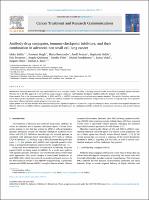Antibody-drug conjugates, immune-checkpoint inhibitors, and their combination in advanced non-small cell lung cancer
Author
Date
2023Permanent link
https://hdl.handle.net/11351/9581DOI
10.1016/j.ctarc.2023.100713
ISSN
2468-2942
PMID
37172552
Abstract
Introduction
Advanced non-small cell lung cancer (aNSCLC) is an incurable disease. The effort to develop treatments with more effective systemic agents continues. This has led to the FDA approval of one antibody–drug conjugate (ADC) and eight immune checkpoint inhibitors (ICIs) for patients with aNSCLC.
Areas covered
Due to the demonstrated efficacy of ADCs and ICIs in aNSCLC, treatment combining both agents merits attention. This article, therefore, explores the use of ADCs and ICIs in patients with NSCLC, assesses the scientific rationale for combination treatment, and provides an overview of ongoing trials. It also presents some early efficacy and safety results of such combination use.
Expert opinion
It is not clear whether ADC-immunotherapy has a significant impact on those with a targetable oncogenic driver alteration since targeted therapies are effective. However, in aNSCLC without a targetable oncogenic driver alteration, the combination of ADCs and ICIs has potential and remains an area of active clinical research.
Keywords
Antibody-drug conjugates, Immune-checkpoint inhibitors; Non-small cell lung cancerBibliographic citation
Salifu I, Singh N, Berraondo M, Remon J, Salifu S, Severson E, et al. Antibody-drug conjugates, immune-checkpoint inhibitors, and their combination in advanced non-small cell lung cancer. Cancer Treat Res Commun. 2023;36:100713.
Audience
Professionals
This item appears in following collections
- VHIO - Articles científics [1250]
The following license files are associated with this item:

 Private area
Private area Contact Us
Contact Us








